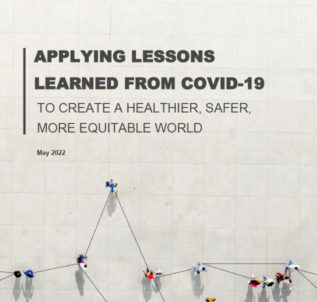Enabling trade


International trade rules allow for a predictable and stable environment for trade to continue. The certainty of trade rules is essential for the pharmaceutical industry’s manufacturing, R&D, and access to raw materials and supply.
Overview
Representing a global industry whose members have R&D and manufacturing operations around the world, IFPMA engages on behalf of the innovative pharmaceutical industry with relevant organizations such as the World Trade Organization (WTO), the G7, G20, Organisation for Economic Development (OECD) and in Africa.
IFPMA engages on industry experiences, issues, concerns, and positions with the aim of facilitating trade and making sure there are little or no access challenges in the upstream or downstream supply of goods and services, or the circulation of people.

The WTO
As the primary global institution responsible for promoting and ensuring open and rules-based international trade, the WTO is playing and should continue to play a leading role in encouraging countries to eliminate trade barriers that impede the distribution of biopharmaceutical products.
IFPMA primarily engages with the WTO on issues related to intellectual property and governed by the Trade-Related Intellectual Property Rights Agreement (TRIPS), as well as matters relating to better collaboration to leverage the full potential of trade for improved health outcomes.
TRIPS is the most comprehensive multilateral agreement on intellectual property (IP). It lays down the minimum standard of protections and incentives a country must provide to make sure there is clarity in national legislation for industry to carry out business.
This incentive framework is critical for all technology intensive sectors, such as ours.
When it comes to trade and health, IFPMA works with the WTO and its member states to strengthen supply chains and make sure that the supply of medical products, raw materials, equipment, and services are not hampered.
We are encouraging WTO members to consider:
- Refraining from export restrictions
- Improving trade facilitations
- Eliminating tariffs
- Strengthening regulatory cooperation and capacity building
- Incentives for innovation.

Intellectual property and trade
Underpinned by WTO rules, strong IP systems are fundamental to a healthy, innovative pharmaceutical industry. IP is also indispensable when it comes to mobilizing resources, technical knowledge, and knowhow.
G7, G20, and OECD
To prepare for potential future health crises, it’s imperative to have policies in place that promote cross border partnerships, investment and growth of local industry, country readiness and absorption, along with a robust healthcare system.
But each regional health and trade challenge is different and requires tailored solutions. IFPMA engages with G7, G20, and OECD to address these.
Africa
The African Continental Free Trade Agreement (AfCFTA), which came into force in January 2022, brings together 54 countries to form a single trading block.
As IFPMA is working in partnership to create a public health ecosystem in Africa to improve patient experience, health outcomes, and resource allocation, we are also engaging on issues relating to trade to facilitate access to medicines.
We support the work of the EU-Africa Business Forum (EABF), which has been the main event preceding AU-EU Summits since 2006, and brings together decision makers across various sectors and countries to address partnership and investment opportunities.
COVID-19 and trade
IFPMA and its members have been actively engaging with the WTO and its member states on trade matters related to COVID-19.
Our aim is to promote faster and timely access to vaccines and therapeutics by advocating for the removal of trade restrictions that have hampered both upstream and downstream supply. Without trade, it is hard to see how the world could have moved COVID-19 vaccines from the lab to the production line, and out the factory gate and into people’s arms at record speed and massive scale.
11 billion doses of COVID-19 vaccines were manufactured by the end of 2021.
Such scale-up impacts the availability of raw materials, skilled workers, and vaccines supply. This increase in global traffic leads to significant and inevitable strain on the global vaccine manufacturing supply chain and any glitch or hold-up in the chain can set back efforts to optimize this vital scale up. A delay in a single ingredient can stall production, which in turn leads to delay in supply.
As part of our five steps to achieve vaccine equity, we call for trade restrictions to be eliminated for the uninterrupted movement of critical supplies, vaccines, and skilled workers to produce enough COVID-19 vaccine doses.

COVID-19
When the COVID-19 pandemic hit, the innovative pharmaceutical industry came together with the broader global health community and responded with unprecedented speed and scale, overcoming major hurdles along the way.
Removing trade barriers to support vaccine equity
Learn more about the critical role open trade plays to support vaccine equity.





